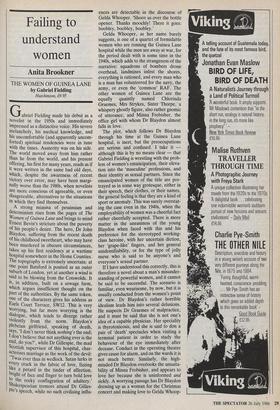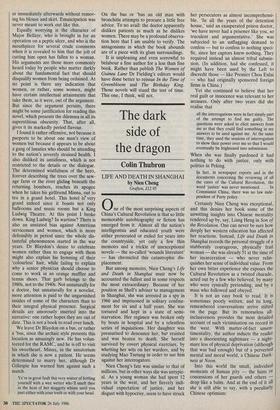Failing to understand women
Anita Brookner
THE WOMEN OF GUINEA LANE by Gabriel Fielding
Hutchinson, £9.95
abriel Fielding made his debut as a novelist in the 1950s and immediately impressed as a distinctive voice. His severe melancholy, his medical knowledge, and his uncomfortable (and apparently uncom- forted) spiritual tendencies were in tune with the times. Austerity was on his side. The world moved away from him rather than he from the world, and his present offering, his first for many years, reads as if it were written in the same bad old days, which, despite the awareness of recent Victory over error, may have been margi- nally worse than the 1980s, when novelists are more conscious of agreeable, or even disagreeable, alternatives to the situations in which they find themselves. A strong miasma of pessimism and determinism rises from the pages of The Women of Guinea Lane and brings to mind Ernest Bevin's stricture about the poverty of his people's desire. The hero, Dr John Blaydon, suffering from the recent death of his childhood sweetheart, who may have been murdered in obscure circumstances, takes up his first residency at a wartime hospital somewhere in the Home Counties. The topography is extremely uncertain: at one point Batsford is posited as an outer suburb of London, yet at another a wind is said to be blowing from the Cotswolds. It is, in addition, built on a sewage farm, which argues insufficient thought on the part of the authorities. By the same token, one of the characters gives his address as Earls Court Terrace, SW12. This is very worrying, but far more worrying is the dialogue, which tends to diverge rather violently from the norm. Blaydon's plebeian girlfriend, speaking of death, says, 'I don't never think nothing's the end; I don't believe that not anything ever is the end, do you?', while Dr Gillespie, the mad Scottish supervisor of this hospital, char- acterises marriage as the work of the devil: Twas ever thus in wedlock. Satan lurks in e.veiy— crack in the fabric of love, fizzing like a petard in the tinder of affection, bright of face and finger to turn bold love to the reeky conflagration of adultery.' Shakespearian tremors attend Dr Gilles- Pie's speech, while no such civilising influ-
G
ences are detectable in the discourse of Gelda Whooper. `Shoov us over the bottle opener. Thanks moochly! There it goes: boobley, boobley, boobley.'
Gelda Whooper, as her name barely suggests, is one of a quartet of formidable women who are running the Guinea Lane hospital while the men are away at war, for the period dealt with is some time in the 1940s, which adds to the strangeness of the narrative: squadrons of bombers drone overhead, landmines infest the shores, everything is rationed, and every man who is a man has volunteered for the navy, the army, or even the 'common' RAF. The other women of Guinea Lane are the equally quaintly named Chlorinda Graemes, Mrs Strykes, Sister Thorpe, a whispery ghostly figure, also rather gnomic of utterance, and Minna Frobisher, the office girl with whom Dr Blaydon almost falls in love.
The plot, which follows Dr Blaydon through his time at the Guinea Lane hospital, is inert, but the preoccupations are serious and confused. I take it although this is by no means clear — that Gabriel Fielding is wrestling with the prob- lem of women's emancipation, their eleva- tion into the 'masculine' professions, and their identity as sexual partners. Since the emancipated women of the title are por- trayed as in some way grotesque, either in their speech, their clothes, or their names, the general feeling is that they are a kind of sport or anomaly. This was surely overstat- ing the case even in the 1940s, when the employability of women was a cheerful fact rather cheerfully accepted. There is more matter in the uneasiness of the young Blaydon when faced with this and his preference for the stereotyped working- class heroine, with her uncertain diction, her 'grape-like' fingers, and her general unidentifiability, or for the type of jolly nurse who is said to be anyone's and everyone's sexual partner. If I have understood this correctly, this is therefore a novel about a man's misunder- standing of powerful women, and it cannot be said to be successful. The scenario is familiar, even wearisome, by now, but it is usually conducted from the women's point of view. Dr Blaydon's rather horrible idealism leads him into several delusions. He suspects Dr Graemes of malpractice, and it must be said that she is not one's idea of a capable physician. Her speciality is thyrotoxicosis, and she is said to don a pair of 'death' spectacles when visiting a terminal patient in order to study the behaviour of the eye immediately after decease. Conduct in the operating theatre gives cause for alarm, and on the wards it is not much better. Similarly, the high- minded Dr Blaydon overlooks the unsuita- bility of Minna Frobisher, and appears to love her because she is uninformed and sickly. A worrying passage has Dr Blaydon dressing up as a woman for the Christmas concert and making love to Gelda Whoop- er immediately afterwards without remov- ing his blouse and skirt. Emancipation was never meant to work out like this.
Equally worrying is the character of Major Bellayr, who is brought in for an operation on a peptic ulcer, and who is the mouthpiece for several crude comments when it is revealed to him that the job of cutting him open has fallen to a woman. His arguments are those more commonly heard today by people who mutter darkly about the fundamental fact that should disqualify women from being ordained. At no point is there any indication that women, or rather, some women, might have certain intellectual attainments that take them, as it were, out of the argument. But since the argument persists, there might be some justification for reading this novel, which presents the dilemma in all its superstitious obscurity. That, after all, gives it its markedly period flavour.
I found it rather offensive, not because it purports to be about one man's view of women but because it appears to be about a gang of lunatics who should be attending to the nation's severely strained health. I also disliked its untidiness, which is not restricted to the details or the dialogue. The determined wistfulness of the hero, forever describing the trees over the sew- age farm or the river gliding beneath the returning bombers, reaches its apogee when he takes his girlfriend Minna, out to tea in a grand hotel. This hotel is very grand indeed since it boasts not only ballrooms and music rooms but a King Ludwig Theatre. At this point I broke down. King Ludwig? In wartime? There is also an unstated bias against American servicemen and women, which is more defensibly in period since the whole dis- tasteful phenomenon started in the war years. Dr Blaydon's desire to celebrate women rather than to engage with them might also explain his hymning of their `colourless' hair, while failing to explain why a senior physician should choose to come to work in an orange muffler and tennis shoes. That garb belongs to the 1980s, not to the 1940s. Not unnaturally for a doctor, but unnaturally for a novelist, more attention is paid to the ungarnished insides of some of the characters than to their integral physical presence. Surgical details are amorously inserted into the narrative: one rather hopes they are out of date. This is not a book to read over lunch.
We leave Dr Blaydon on a bus, or rather a 'bus, since the archaic style presents this locution as amusingly new. He has volun- teered for the RAMC, and he is off to visit his sweetheart, Minna, in the sanatorium in which she is now a patient. He seems determined to marry her, although Dr Gillespie has warned him against such a match.
Ye're in great fault this very winter of fettling yourself with a wee wetter who'll smelt thee in the heat of her maggoty whims until you part either with your truth or with your head.
On the bus or 'bus an old man with bronchitis attempts to procure a little free advice. To no avail: the doctor apparently dislikes patients as much as he dislikes women. There may be a profound observa- tion here that I am unable to verify. The antagonisms in which the book abounds are of a piece with its glum surroundings.
It is unpleasing and even sorrowful to belabour a fine author for a less than fine book. Rather than publish The Women of Guinea Lane Dr Fielding's editors would have done better to reissue In the Time of Greenbloom and The Birthday King. Those novels will stand the test of time. This one, I think, will not.



















































 Previous page
Previous page